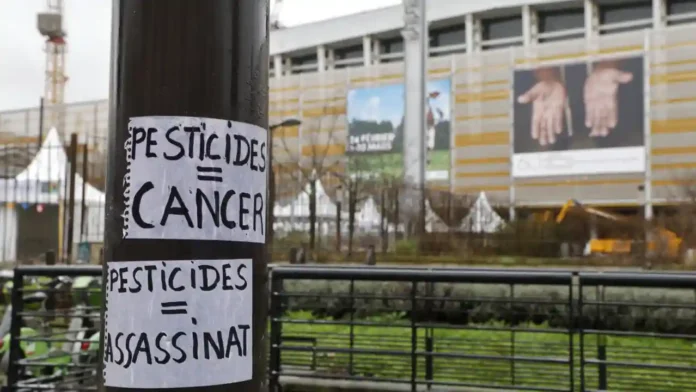
A recent investigative documentary series, Vert de rage (Green with Rage), aired by public French television, has raised alarming concerns about pesticide contamination in fruits and vegetables sold in major French supermarkets.
The report analyzed 22 samples of produce purchased from various retail chains, revealing that seven of these contained pesticide residues that have been banned within the European Union.
Banned Pesticides Detected
Among the shocking findings was the presence of two banned substances in a grapefruit imported from China: chlorpyrifos and propiconazole.
Chlorpyrifos, recognized as a neurotoxin and an endocrine disruptor, has been banned in the EU since 2020 due to its harmful effects on human health and the environment. Similarly, propiconazole, identified as toxic for reproduction, has been prohibited since 2009.
The investigation also highlighted other troubling examples. Grapes imported from Peru were found to contain residues of imidacloprid, a member of the neonicotinoid family known for its harmful effects on bee populations, alongside myclobutanil, a fungicide that was withdrawn from the European market in 2021.
Furthermore, an orange sourced from Tunisia was reported to contain malathion, a pesticide classified as “probably carcinogenic” and banned in the EU since 2008.
Research Findings from PAN Europe
The documentary draws on research conducted by the Pesticide Action Network Europe (PAN Europe), an NGO that analyzed data from the European Food Safety Authority (EFSA).
This research found that pesticides banned in Europe were notably more prevalent in specific product categories, particularly coffee, tea, spices, and certain vegetables.
Among the most affected items were Tahitian limes, passion fruit, and plums, with rice, zucchini, and plantain bananas also registering contamination.
PAN Europe highlighted that imported foods are significantly more likely to contain EU-banned pesticides than those grown within the EU.
“Imported foods are twice as likely to contain pesticides banned by the EU as foods grown in the EU,” the organization stated. This discrepancy underscores the risks associated with relying on international supply chains for food products.
Food Safety and Recalls in France
In response to these findings, the French public agency responsible for food safety, the Directorate General for Food (DGAL), reported that in 2022, there were 2,446 food recalls in France, with 328 linked to pesticide contamination.
Notably, 296 of these recalls involved products containing at least one banned pesticide or pesticide residues that exceeded the maximum limit authorized for food.
The Rapid Alert System for Food and Feed (RASFF), a European alert mechanism that monitors food safety issues, also indicated that pesticide residues were the leading cause of food warnings in the region.
Out of 114 notifications concerning products distributed in France, 104 were related to the presence of banned pesticides. In 2023, RASFF issued a total of 292 notifications for pesticide-contaminated products, with 77 of those involving at least one banned substance.
Countries of Origin for Contaminated Products
The Vert de rage report further analyzed the origins of the products contaminated with banned pesticides, revealing that in three years, 26.46% of such items distributed in France came from India, marking it as the country most frequently associated with these issues.
This finding raises significant concerns about the safety protocols and agricultural practices employed in food-producing nations.
The documentary also brought attention to the practices surrounding pesticides that have been banned in the EU but continue to be manufactured in France for export to countries where they remain legal.
According to research by Swiss NGO Public Eye, the top five destinations for French-produced pesticides in 2023 were Brazil, Ukraine, the United States, Russia, and the United Kingdom.
Environmental and Health Implications
Experts are increasingly concerned about the environmental impact of these banned pesticides, especially in relation to water quality.
Despite the prohibition on the sale of certain pesticides within France, the continued production for export raises alarms regarding the potential contamination of drinking water, surface water, and groundwater in the regions hosting these factories.
The implications for public health and environmental safety are significant. The presence of neurotoxic and carcinogenic substances in food raises questions about the regulatory measures in place to protect consumers.
Public health advocates are calling for more stringent controls and transparency in the food supply chain, particularly regarding the safety of imported products.
The Way Forward
In light of these findings, there is a pressing need for regulatory bodies in France and across Europe to reevaluate their monitoring practices and take proactive measures to ensure that food products are free from harmful pesticide residues.
Consumers must also be made aware of the risks associated with certain imported products, encouraging them to demand greater accountability from retailers and suppliers.
The documentary Vert de rage serves as a critical reminder of the ongoing challenges posed by pesticide contamination in our food systems.
As consumers, it is essential to remain vigilant and informed about the origins and safety of the products we purchase, advocating for a food supply that prioritizes health and environmental sustainability.
In conclusion, the revelations from Vert de rage highlight an urgent issue that demands immediate action from both authorities and consumers alike.
The safety of our food should not be compromised by the complexities of global trade, and the fight for a pesticide-free future must be a collective endeavor.